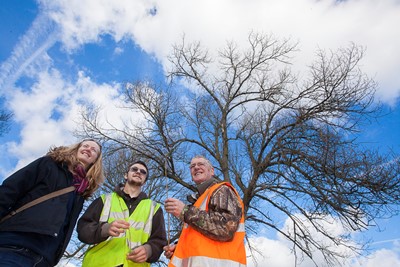
A group of Britain’s rarest trees has been discovered – in a lay-by alongside a busy main road.
The Black Poplar is scarcer than the Giant Panda but 14 previously unknown trees, each about 150 years old, have been identified in the hedgerow alongside the A525 Denbigh to Ruthin road near the village of Rhewl.
The Rhewl trees have turned out to be from a completely new strain of the tree and have been given their own clone number by the Forest Research Centre in Scotland.
They have been found thanks to a survey commissioned by rural regeneration agency Cadwyn Clwyd and carried out by Welsh woodland organisation Coed Cymru.
It is paid for through the European Agricultural Fund for Rural Development (EAFRD) through the Welsh Government’s Rural Development Plan and is part of a three-year plan to revitalise rural communities and their economies in the county, and is open to food producers and businesses from across North East Wales.
The Rhewl find is one that has excited Mike Hughes, Coed Cymru Woodland Officer for Denbighshire, who led the survey which has identified 99 Black Poplars in the Vale of Clwyd – there are only 2,500 in the whole of the UK.
All 99 trees found in rural Denbighshire are male – there are two females in Dyserth and one in Flintshire but the practice of cloning the trees from cuttings from male trees explains the imbalance.
He said: “It is the rarest British hardwood although it was widely planted in previous times though these were usually through rooted cuttings because it is very difficult to pollinate the trees.
“Seventy-six of the 99 trees in the Vale are from one particular clone, number 23, while another nine are clone 34 – the trees in Rhewl have had to be given their very own clone number, 112.
“They were planted about 150 years ago by someone who just pushed rooted cuttings into the ground along the line of the hedge – somewhere around here there may still be a tree, probably about another hundred years old, which is the mother tree.
“The Black Poplar really is a classic tree of the British flood plain and would have been widespread but because land has been drained it has become less common and now is only found in pockets and one of those is the Vale if Clwyd.”
Now students from Llysfasi College have taken cuttings from the trees to ensure their survival and these will be replanted in the Vale of Clwyd if they root successfully.
Sarah Jones, Enironment and Heritage Officer for Cadwyn Clwyd, said: “The side shoots on the trees are ideal cuttings and the students will take them back to Llysfasi to plant.
“They do like really wet ground and would once have been found along riverbanks with willows and they are a keystone species which supports lots of other species, especially invertebrates.
“They’re only found in pockets of the country now and the Vale of Clwyd is one of those pockets but we hope now to extend this survey to other parts of North Wales.
“It’s very significant to find a new clone variety because the tree’s gene pool is very restricted and that is a disadvantage if they are threatened by disease as these are.”
Black Poplars, which live to be hundreds of years old, have characteristics that made them popular with medieval housebuilders and cartmakers – the branches curve elegantly and when split make perfect crucks for cruck barns.
And the wood doesn’t splinter and it doesn’t burn: “It was very popular for use in carts and on bedroom floors where people might be walking around in bare feet and didn’t want to get splinters,”
Mike said: “Because it doesn’t burn it was also used for the floors around hearths and also for brake blocks on carts, coaches and even on steam trains.
“But once we started sailing round the world and stealing other people’s timber its popularity waned and now there are more giant pandas in the world than there are Black Poplars in the UK.
“Another reason for trying to preserve them and increase their numbers here is because there is a disease called venturia which is wiping them out over in Manchester and Cheshire and this could help us identify strains that will be resistant to it.
“But they’re not very good at reproducing so they need our help and we’re very grateful for the co-operation of local landowners who have been very helpful with the survey and in return we will provide them with more Black Poplars.”
Anyone interested in Cadwyn Clwyd’s projects can ring 01824 705802 or e-mail admin@cadwynclwyd.co.uk